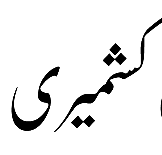Syed Shahinda
 The Kashmir valley is home to various great mystic poets, for which, it is also referred to as Resh Waer (The land of Reshis’). In Vedic texts, Reshi means an inspired poet, who invokes the deities with the poetry. However, this Sanskrit word, despite its more appropriate usage in Hindu texts has been used for the people irrespective of their faith. Poetry and spirituality are inseparable and this close proximity can be seen in Kashmir valley.
The Kashmir valley is home to various great mystic poets, for which, it is also referred to as Resh Waer (The land of Reshis’). In Vedic texts, Reshi means an inspired poet, who invokes the deities with the poetry. However, this Sanskrit word, despite its more appropriate usage in Hindu texts has been used for the people irrespective of their faith. Poetry and spirituality are inseparable and this close proximity can be seen in Kashmir valley.
The history of Kashmir is full of the epitomes of such great personalities. Such people were visionaries, who prophesized about future. They were truly the legends who gave the land of Kashmir one more facet to be proud of. Of these precious gems of the beautiful Valley, most eminent were Lala Ded and her closest contemporary Sheikh Noor-ud-din Wali (RA). They were not only the first mystic poets but also the first ones who chose to write in their native language, when the land was profoundly dominated by the foreign languages.
Lala Yogeshwari referred as Lala Ded, was born in 1320, a few decades before Sheikh Noor-ud-din Wali (RA). It is believed that Sheikh Noor-ud-din (RA) was highly influenced by Lala Ded. Sheikh-ul-Alam in one of his poems prayed to God to grant him the same level of spirituality as that of Lala Ded. The subject of their poetry remained same as they had the same inspiration that is the quest of the eternal truth. Their poetry deals with the themes like spiritual experience, non-violence, and misery of man. Their themes were beyond the boundaries of religion. As such they are held in reverence by both Muslims and Hindus. Lala Ded is referred to as Lala Arifa by Muslims and Laleshwary by Hindus while Sheikh Noor-ud-din (RA) is known as Sheikh-ul-Alam by Muslims and Nund Rishi by Hindus. This deference is apparently the reflection of their love and concern for mankind. Their only aim was to unearth the eternal truth, which for them was God. For them truth was God and God was truth. As Lala Ded said, “There is no reality but God.”
While many would be quite familiar with their works others might have only heard of their names, these ‘others’ fall in the category of today’s modern generation. Many of us pursue English or Urdu literature studies as vocation, however, most of us read it for leisure. There is not a single person who is untouched by poetry. In this age of internet and gadgetry, we tend to read and share great pieces of poetry on social networking sites. Our mobile phones and laptops are mostly stuffed with poetic content. We are rightly, fascinated by verses of Shakespeare or Wordsworth, Galib, or Faiz.
Unfortunately, majority of us fail to appreciate our own literature, as we do not value our language (Kashmiri). We have reached a stage where we hesitate to speak in native language. Some even consider it too disgraceful to speak. In this process our generation has turned its back against the vast and rich literature of our own. Our generation needs to realize that when England and other European countries were busy writing the monotonous pagan and chivalric poetry, our great poets like Lala Ded and Nund Reshi had quite and far earlier achieved the spiritual excellence. Our people had quite earlier realised the ultimate truth of life and written in their indigenous language when Sanskrit and other languages were dominant.
If we appreciate the love of Wordsworth for nature, shouldn’t we appreciate Alamdar-e-Kashmir, who said “Ann poshi teli wann poshi” (food will thrive only till the woods thrive). To write such lines as early as 14th century when the Valley was full of lush green forests and beautiful landscapes. A time when the gifts of nature would seem limitless reflect the great vision, love and concern of our saint for nature.
I will weep and weep for you o mind (my soul)
The world hath caught you in its spell
These lines which remind us of Emily Dickenson, the 19th century American poet, were already written centuries ago by our great poetess Lala Ded.
This is neither to belittle the great poets of English or Urdu nor a call to stop appreciating them but only to recognize and trace our own roots. Furthermore, this is to understand that in the world of poetry and literatures our Valley doesn’t lag behind.
We must realize that had Chaucer felt ashamed of his own language and diction what would have been the fate of English language and literature today. Therefore, let us try to continue and keep alive our language and literature. Let our next generations feel proud of rich repository of our own literature and not be ashamed of it.
The author can be mailed at syedtabinda.1@gmail.com





